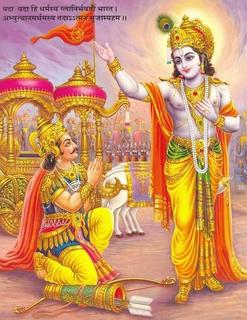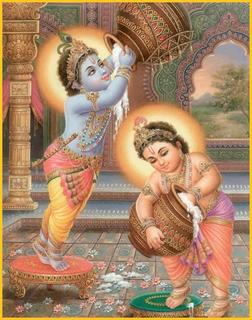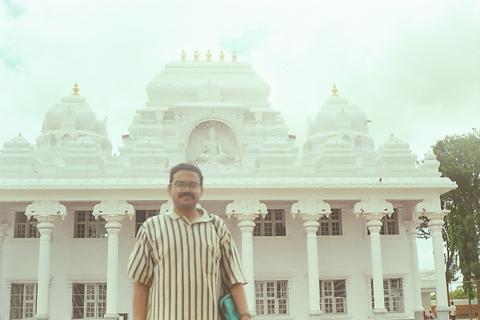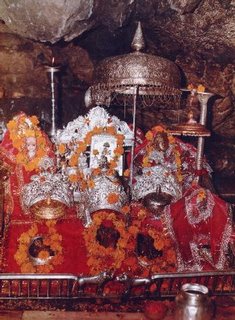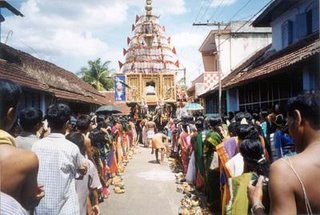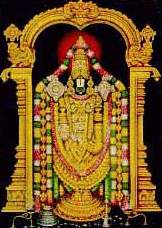Sunday, June 18, 2006
Saturday, June 03, 2006
Kabir's Story: Real Vs Fake emperor
Dear friends,
In these days when religion is seen as an almost insurmountable barrier between different groups of human beings - giving rise to riots, conflicts, even terrorism - it is enlightening to recall the real life story (?) of the King of a Muslim nation in Central Asia who came to India in search of the Truth. I reproduce below this story (a friend of mine sent this piece) in the hope and belief that you may in your leisure enjoy reading it.
V V R
20th Mar 2006
* *
REAL VERSUS FAKE EMPEROR:
(A Real Life Story)
This is the life history of an Emperor who lived about 600 years back. His name was Ibrahim Adham, and he was the ruler of Bukhara, now part of Uzbekistan. He was a wonderful monarch, greatly loved by his people. But his greatness also made him ask basic questions about life, many of them the same that had troubled Siddhartha the prince before he reached Buddha- hood. So, while sitting on his throne, he often used to ponder over questions of deep philosophy, such as:
"What is life? Why are we here? Is there a God?; and if so why is He hidden from us?"
One day when he was so engaged in introspection, he heard a noise on his terrace. When he went to investigate upstairs, he was astonished to find a herdsman with a stick searching for something all over the terrace.
"Who are you, and how did you get to this place outwitting all my palace guards?" the emperor asked.
"I am just an ordinary farmer who has lost his camel, and I have come here looking for it", replied the herdsman.
The king was even more astounded: "What? You lost your camel, and you managed to enter the palace and get to this most guarded part of it in the hope of locating it? But tell me; is it not very foolish of you to be looking for a lost camel in such a place? Whoever heard of a camel straying onto the terrace of a palace, that too one guarded by thousands of soldiers?"
The herdsman calmly replied: “No more foolish than looking for an answer to life's basic questions while sitting on a golden throne", and vanished into thin air!
This encounter shook Abraham Adam to the core, and he immediately left his throne in search of the Truth. He traveled as a mendicant from place to place, until finally he heard that a great mystic named Kabir lived on the banks of the river Gaga in Varaanasi in what was then known as Hindostan, and so made his way there (these days when we need planes and trains to go from place to place, it is so difficult to believe how easily people criss-crossed continents before these inventions were made!).
Kabir was a weaver by profession, and lived a hand-to-mouth existence off his daily earning as a weaver. He had an ashram where his disciples lived with and learnt from him. Many of the disciples were extremely rich, but he would take not a penny from any of them to feed himself or his family, consisting of his wife Loi, his son Kamal and daughter Kamali.
When Ibrahim Adham reached the door of the ashram and knocked, Kabir opened the door and asked. "Yes, what do you want?”
"Sir," replied Ibrahim Adham, bowing with respect," I have heard that you teach the Truth here, and I have come a long way to learn it. I will be ever grateful if you can take me into your ashram and teach me."
"Who are you?” asked Kabir.
"I am, actually, the Emperor of Bukhara, but I have given up my throne in order to search for the Truth." replied Ibrahim.
"Sorry," said Kabir," I have no room for emperors here," and closed the door.
Ibrahim then ruminated over what had happened, and what he had said. He then knocked again, re-introduced himself as Ibrahim rather than as Emperor, and was let in, on condition that he would do the job of the scavenger at the ashram.
And so for years Ibrahim was the dutiful scavenger at Kabir's ashram – sweeping and swabbing the floors, cleaning out the toilets. After six years passed, Kabir's wife Loi requested her husband to bestow the gift of initiation on Ibrahim (initiation -isn’t it the first step in imparting the deep mysteries of spiritual education?).
"No,' answered Kabir, "he is not yet ready. His mind still needs to be cleansed of the impression that he is born to rule over others."
"How can you say that?", asked Loi," it is now six years that he has done all the menial jobs around here, surely that earlier impression must have been wiped out."
"All right, carry out the following test." said Kabir. " Collect all the human waste one day, stand on the terrace, and when Ibrahim is passing by downstairs, throw it on him, hide yourself, and come and report to me what he says."
Loi did as instructed, and saw Ibrahim's face turn livid at the insult. He looked up and around, and not finding anyone, muttered to himself, "If only this was Bukhara, I would have given this person what he deserves."
Loi went and faithfully reported this to Kabir, who remarked," See, this is what I meant. He needs to cleanse his mind further."
Another six years passed, and one day Kabir called Loi and asked her to repeat what she had done to Ibrahim. This time Ibrahim said .with gratitude written all over his face," I do not know who did this, but I am really thankful to whoever has done it, for it helps me know my real status."
Kabir knew that by then Ibrahim had done the required purification of the mind needed before initiation can be bestowed. Ibrahim was therefore initiated into the spiritual mysteries, and turned out to be one of Kabir's best disciples. Before long he had reached the ultimate in the ladder of spiritual progress – attainment of one-ness with the Supreme.
Kabir then sent him back to Bukhara, where he was living the life of an ordinary man when one day his former Commander-in-Chief spotted him lying on the banks of a famous river. The Commander-in-Chief implored Ibrahim to come back to the capital and sit on the throne again, adding, "Sire, we in the army are ever ready to carry out every single one of your orders".
"Don't promise what you cannot fulfill," said Ibrahim. This statement hurt the Commander-in-Chief very much, for he thought Ibrahim was questioning his loyalty, and so he replied," Sir, please command, and your wish shall be instantly fulfilled."
Ibrahim then took a small pin, and threw it into the flowing waters of the river. "All right, then, retrieve that pin for me," he told the Commander.
The river was a deep one, the water was flowing very fast, and the pin had obviously sunk to the bottom. To retrieve that very pin was humanly impossible, and the Commander knew it.
"You want a pin, Sir – I will get you a thousand pins exactly the same as the one you threw," he offered.
"No, no, I do not want anything other than that very pin. You said my wish will be your command, so get me that pin", said Ibrahim.
The Commander was crest fallen, and protested, "Sir, you are asking for something that even an army of brigades of brave soldiers cannot accomplish. God alone knows how far that particular pin has been swept by the swirling waters of the river, which is so deep that diving to its bottom will require great talent and courage. Even if a thousand soldiers were to do that and search all over the riverbed, it is unlikely they will be able to locate and retrieve that very pin."
"Okay, then, watch," said Ibrahim, and 'applied his attention' – (a term used by the mystics to refer to the high levels of mental concentration that the higher forms of yoga give them access to.) On his so doing, a fish dived into the river, picked up that very pin from its bed, swam to the shore with it, then walked on the beach, deposited the pin at Ibrahim's feet, walked back to the river, and went back into the waters.
The Commander-in-Chief stared in total disbelief at what he was witnessing.
"What I have learnt at the feet of Kabir," Ibrahim explained to him," is that those we call Emperor in this world are fake Emperors; in fact, are imposters. The world does not operate at their command, as we mistakenly believe, but they who operate at the command of their selfish egos. They are slaves of the first order, not emperors. The only way to become an emperor – a real emperor, who has mastered the Laws that govern this universe - is to learn to still one's mind, for which the pre-requisite is to get over our ego-centric preoccupations. That is why Kabir insisted that I spend years as a scavenger in his ashram. It was a preliminary training to the secrets of the inner worlds that lie within each of us. Anyone who is willing to let go the ego can get trained in this wonderful Science of the Soul, which makes us real Emperors, for then we are one with the Supreme Power."
The Commander-in-Chief realized that Ibrahim had become a Saint, one who had achieved Godhood, and fell at his feet.
* * * * * * * * * *
(The real measure of your wealth is how much you would be worth if you lost all your wealth!)
-Unknown
(How much pleasure you take in acquiring worldly goods!
But to find happiness you must give them all up)
-Ashtavakra Gita 18/2.
Aishwarya with Prez
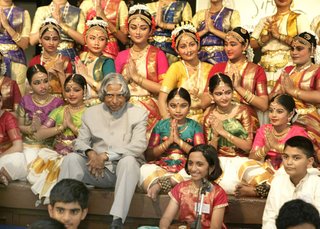
Aishwarya, the daughter of Nandini, my wife's niece with Indian President Dr. APJ Kalam at Singapore
Labels: With Indian Prez
Our visits: Sri Kalahasthi
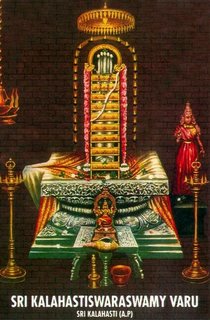 [Iyer123] God and the Spider:
[Iyer123] God and the Spider:(There are people in the world so hungry, that God cannot appear to them except in the form of bread.) --Mahatma Gandhi
Indeed God has many ways of helping us when we are in distress (refer write up dated 21st Sep 05 by one of our fellow members). While our Scriptures are replete with stories and anecdotes, the posting referred above offered a refreshingly new insight into the good Lord’s doings. The reference to the spider triggered me to pen this piece which again may be of interest to the younger lot.
When faced with problems that seem to have no solutions, miracles come in many forms. It helps us appreciate that we shouldn't be too quick to think God doesn't have an answer. We are reminded that God not only is abundantly able to meet our needs, but willing to work in exceptional ways to do so when necessary. It's a pervasive theme of Scriptures that the God, who created the rules of nature, can bend them when needed to accomplish his purposes. Time and again we see him performing miracles in people's lives. Reflecting on these examples can help move us beyond the limits we tend to place upon how God might choose to work in our own life. It helps us too, not to think too narrowly about what constitutes a miracle.
For one thing, to think of them this way is reverent. It deepens our awareness that God has helped us, and strengthens our conviction that He will take care of us in the future. It is often more logical too to consider these events as miracles than merely unusual coincidences. To assume a coincidence requires us to come up with a complicated or convoluted explanation of what happened. If we accept that miracles are possible, at least, then usually the most natural conclusion in these cases is that one has occurred. Some expectation of the miraculous is also healthy--often necessary--when we weigh taking steps with our life in cases where our possibility of success seems good. No matter how carefully we plan a venture, we almost always encounter problems that we didn't anticipate which stretch us to the limit. The fear of these unforeseen obstacles can discourage us from even getting started; the "what if's?" can paralyze us. Believing that God loves us enough to bail us out of unexpected predicaments can make the difference in our finding the courage to go ahead.
Kalahastiswara Temple.
Sri Kalahasthi in Chittoor, (AP) is an important temple dedicated to Lord Shiva. The lingam ('Vayu lingam') representing one of the five elements (air-vayu) is one of the Panchabhootha sthala of Lord Shiva. We were shown a lamp inside the inner sanctum that is constantly flickering, despite the lack of air movement inside and believed to move even when the pujaris close off the entrance to the main deity room, which has no windows. We saw the flames of several ghee lamps flicker as if blown by moving air. The lingam is considered Swayambhu, or self-manifested. The main lingam is untouched by human hands, including the priests’. Abhishekam is offered to the utsava-murti, not the main lingam.
This temple is also called 'Dakshina Kailash' (the abode of Lord Shiva in the south). The river Swarnamukhi brought to earth by Agastya Muni runs near this temple giving the place an added sacredness.
The Sthalapurana goes like this. A spider, an elephant and a snake were living in the vicinity of the temple. All three were ardent devotees of Lord Shiva. It is said that the spider wove a web above the lingam to protect it from the sun and rain. The elephant would fetch water with its trunk and perform abhishekam on the lingam and the snake too would worship the Lord with flowers. The snake was not aware that the elephant and spider were also worshiping the Lord. One day the snake found bilvam leaves and water near the Lord. It thought that someone was trying to harm the Lord, so it surrounded the Lord to protect him. When the elephant came the next day to worship the Lord, the snake thought he was trying to harm the Lord, so he entered his trunk. Unable to handle the pain, the elephant dashed his trunk against the lingam, killing both the snake and the spider. Then the elephant too died.
Because of the devotion with which each one of them had spent their days worshipping, the Lord made these three souls to merge in Him and took the name Sri-Kala-Hasthi which denotes the conjoining of the spider (Sri), the snake (Kala), and the elephant (Hasthi) thus becoming Sri Kalahatheeswarar. This temple is also associated with Rahu and Ketu. Adi Sankara is said to have visited this temple and offered worship here.
Another Spider story
HUNDREDS of years ago there was a king of Scotland and his name was Robert the Bruce. It was a good thing that he was both brave and wise, because the times in which he lived were wild and dangerous. The King of England was at war with him, and had led a great army into Scotland to drive him out of the land and to make Scotland a part of England. Battle after battle he had fought with England. Six times Robert the Bruce had led his brave little army against his foes. Six times his men had been beaten, until finally they were driven into flight. At last the army of Scotland was entirely scattered, and the king was forced to hide in the woods and in lonely places among the mountains.
One rainy day, Robert the Bruce lay in a cave, listening to the rainfall outside the cave entrance. He was tired and felt sick at heart, ready to give up all hope. It seemed to him that there was no use for him to try to do anything more. As he lay thinking, he noticed a spider over his head, getting ready to weave her web. He watched her as she worked slowly and with great care. Six times she tried to throw her thread from one edge of the cave wall to another. Six times her thread fell short.
"Poor thing!" said Robert the Bruce. "You, too, know what it's like to fail six times in a row.
But the spider did not lose hope. With still more care, she made ready to try for a seventh time. Robert the Bruce almost forgot his own troubles as he watched, fascinated. She swung herself out upon the slender line. Would she fail again? No! The thread was carried safely to the cave wall, and fastened there.
"Yes!" cried Bruce, "I too will try a seventh time!"
So he arose and called his men together. He told them of his plans, and sent them out with hopeful messages to cheer the discouraged people. Soon there was an army of brave men around him. A seventh battle was fought, and this time the King of England was forced to retreat back to his own country.
It wasn't long before England recognized Scotland as an independent country with Robert the Bruce as its rightful king. And to this very day, the victory and independence of Scotland is traced to a spider that kept trying again and again to spin her web in a cave and inspired the king of Scotland, Robert the Bruce.
"If at first you don't succeed, try try and try again".
VVR
30th Sep 2005
THRISSUR THAATHY AND DVAMDVATVA
THRISSUR THAATHY AND DVAMDVATVA
(This I dedicate to the Senior citizens of the group whose vision and experience combine to form beacons (maargadarshini) to guide the next-gen and future generations of the forum)
If by philosopher we mean one who acts calmly and rationally in the affairs and changes of life, well I knew one closely. She hailed from Palghat but spent better part of her married life in Tiruvambaadi, Thrissur just close to the Krishnan Temple. No wonder she had Lord Krishna residing in her heart all the time and in every breath. If you found her absolutely unruffled and happy all the time you can’t blame her. She was merely living up to her name-“Aanantham”-for short.
“Otherwise my full name in the ration card”, she would chuckle “is Vaidyanaathapuram Venkiteswaran Ananthaambaal”
Though born in a pretty progressive family, she did not educate beyond 5th grade. This academic background, I was to learn later turned out perhaps to be her biggest asset. Mind you, her father was a “who is who” in that remote village! Popularly known as ‘M.A Venkitchu’ because of his post graduation, he rose to become the first Indian Principal of Maharaja College, Ernakulam. But then I am digressing. This is about Thrissur Thaathi and not about her father.
Having had no formal schooling or training of any sort, her mind remained unstained, fresh as a Lily, always receptive and ready to soak in all sorts of ideas. This academic background notwithstanding, she acquired varied skills through sheer personal efforts and interaction with people. Her forte? Mental Arithmetic, Sanskrit, Malayalam literature and Manipravaalam. Her managerial skills would have left many a modern day H R executive of B School origin astounded. She was at her best when the chips were down. I have often been struck by the coolness and aplomb displayed by her in emergencies. Her husband of Koduvayur origin was a teacher, an academician and ran a Typewriting Institute through the portals of which many a poor Brahmin boy udaranimittam has passed on his way to the then Bombay seeking employment having mastered the ‘halving principle’ of Pittman’s shorthand. He was Rama Iyer, a perfect match for that intellectual beauty, Aanantham in body and soul. They reared 3 sons and 3 daughters all to become later highly accomplished in their own fields.
My first encounter with Thrissur Thaathi was in early 1970 when she was aged 82. But she looked not a day older than 50. My wife introduced me to her. Thaathi had been widowed since quite some years then. There was an aura of genuine concern in her, as she enquired about me and my parents.
“I have heard such a lot about you Thaathi from my wife” I ventured.
“Don’t believe them” she said with a toothless benign smile.
Hours passed as we exchanged views on many topics. Then I shot her a question more in jest than seriousness. But the reply she gave was to have a great impact on my youthful mind.
“How come Thaathi you react differently from all of us even under stress? Your reaction to any difficult situation is as though you knew all the time that the crisis is coming- except for it timing”, I laughed
She, who swore by the Bhagawat Geetha merely said, “DVAMDVATVA” or the ability to support opposites”
“What is that Thaathi?” I got interested. The next few minutes she talked and I listened open mouthed. It went something like this.
“The Geeta is a treatise that has worn extraordinarily well, with all cross-sections of people. Each time we read, new meanings are evolved to our lives. One aspect referred to in every chapter is the existence of Dvamdvam (pairs of opposites) with a warning for all to live away from this realm of dualistic experiences by maintaining equipoise and balance of mind under all circumstances. Krishna draws Arjuna’s attention to this feature, time and again (figure inside the bracket shows the chapter number). Words like samaduhkhasukham (2), kritena akritena (3), karma akarma (4), nirdvandvah (5), sheetoshna (6) dvandvamohena (7), na dveshyah na priyah (8), shubha ashubha (9), aadi anth (10), sat asat (11), tulya nindasthuthihi (12), avibhaktham vibhaktham (13), maanapamaanayoho (14), dvandvevimuktha (15), pravirthimcha nivrithimcha (16), sidhyaasidhyoho (18) are suggestive of the world of ‘DVAMDVAM’. Thus, it would seem even sin has as much a place in this world as virtue, and like other pairs of opposites they also surround every one. Their presence cannot be questioned. It is in the nature of things for two quite opposite things to coexist. We have no alternative except to accept Dvamdvam as inevitable. But what we can do is to heed the repeated advice of the Lord to try and insulate ourselves from the influence of Dvamdvam and not get unsettled. If we achieve this even in small measure, we would be closer towards absolute freedom.
We get unwittingly trapped in a web of good and evil, virtue and vice leaving us ponder at the end of the day if we did well or evil not realizing that we had no role at all in the decision-making! We influence “nothing”, in the context of altering “nature of things”, in the total perspective of the universal canvas. Na eva kinchit karomi (Chap V, verse 8, Geetha) is the underlying principle (I do nothing at all). Nirmama Nirahamkrithah (Have no sense of “Mine” and “I”). If this principle is accepted, life becomes simple all of a sudden. If not, we become incapable of facing the challenges of life and meeting its rising demands. In our false estimate of things and beings, we tend to play out of tune with the whole orchestra of life. Let’s heed the advice of Krishna and keep away from the realm of pairs of opposites and become Dwamdva vimukthaah. Keeping our minds balanced in success and failure- (Sidhyaasidhyoho samam kuryaadh); let’s not lose our equipoise, even mindedness and balance of mind under any circumstances. As the future unfolds itself, let’s take life as it comes”, she had said.
It was Dec 1971. Indo-Pak Cease fire had been declared. My first child born in Mumbai was a few days old. An IAF aircraft was to fly all the way from Pathankot to Mumbai. And when I got a call from Mumbai saying Thrissur Thaathi was sinking I took that flight to be at her side at Nanavati hospital. When I held her hand I felt that I did not want to be anywhere else in this world. A few moments later she joined her husband at the heavenly abode. I controlled my self admirably because I knew she would not approve of my emotional outburst. “Be Dvandvavat”, she had said, a single word which became the underlying philosophy of my life. The only time I get a lump in my throat is when I hear her favourite song some time in the radio,
(Thetchi mandaaram tulasi picchaka poomaala chaarthi
Guruvaayurappa ninne kani kaanenam!)
How do I know about her so much you mean?
Well, she was my MIL’s MIL.
“You mean Mother-in-law’s Mother-in law?” you may ask.
“No. Mother-in-love’s Mother-in love” will be my answer.
Rgds
V V R
30th May 06.
Tripurahara & Thatha
TRIPURAHARA & THATHA
(Dedicated to the young ones)
(It was Pradosham. My daughter was reciting her newly learnt Shivaananda Lahari adopting a Raagam each for each verse. Hardly had she reached the 3rd verse when my father (now late) interrupted and the two got lost in an animated conversation thereafter, my father doing most of the talking. In the process I learnt a story too. This is how it went.
“Alright! Trinethra, Trinayana, Trichakshuh, and Trilochana – all refer to the three-eyed Lord Siva. Hara the destroyer is also Siva. But Tripurahara (in verse 3), (granting that is also Siva,) how did He get this name?” quizzed my father.
“Well… How Thatha? Did Siva destroy 3 cities or something?” responded my daughter taking a pot- shot in the dark based on her elementary Sanskrit.
“Not bad. You are spot on…..and thereby hangs a tale. And by the way, for better effect one is supposed to recite one verse each alternately from Shivaananda Lahari and Saundarya Lahari”, advised my father and proceeded to narrate the story.)
Maya, the Danava, was the architect of the Asuras. As he saw the Asuras repeatedly wage war on the Devas and suffer one defeat after the other, he became thoughtful. At last, he perceived that the Devas are successful because of their ascetic power and merit. He then resolved to perform a very difficult penance to accumulate ascetic merit and defeat the Gods.
He expounded his plan to the other Asuras. Two powerful Asuras, named Vidyunmalin, and Tarakaksha offered to join him in his meditations. Maya along with the other two retired to a remote place and performed a tough penance for many thousand years.
At last, Lord Brahma was pleased and appeared before them and offered them boons. Naturally, all three wanted immortality. Upon being told that it was impossible, Maya said, "We Asuras live in constant fear of the Devas. Our cities are not safe from the assaults of the Gods. I shall construct three forts, one each of iron, silver and gold. Let them be impregnable against all Gods."
Brahma said, "Just as mortals may not obtain immortality, inanimate objects also cannot be impregnable. You must choose the mode of these forts' destruction also. You can make it as difficult as you wish, making them practically impregnable."
Maya said, "Let them not be destroyed unless Lord Shiva himself destroys all three with a single flaming arrow." Now, Maya was a great devotee of Shiva and was confident of his protection, so he proposed this method of destruction. Moreover, he knew Shankara Bhagawan was ever immersed in dhyana and will have no time and would not be a threat to them.
Lord Brahma said, "So be it." and disappeared.
Maya put forth all his skills and constructed three great forts, of iron (for Taraksha), of silver (for Vidyunmalin) and of gold (for himself). These forts were also well stocked with all sorts of advanced weapons to fend off invaders. When word got round of their safety, all the Asuras flocked to them. Soon, you could not find an Asura who lived outside these forts. The three forts were known as Tripura (Tri=three, pura=city). Usually they floated separately in the sky, but their orbits were such that, whenever the star Pushya was ascendant that too in a particular manner, they became a single fort.
Thanks to the benevolent nature of Maya, the Asuras were no longer evil. They were all great devotees of Lord Shiva. Regular worship was offered to him. Of course, this tame state of affairs could not last long. Slowly, the demons became intoxicated with a sense of their own importance. They let loose a reign of oppression on all creatures. Maya repeatedly warned them against their evil acts, but they would not listen.
Indra and the Devas were alarmed at this development. They went to the abode of Brahma and said to him, "Sire, Please save us from the ravages of these demons. They are threatening to turn the whole world upside down! Because of your boon, we cannot defeat these Asuras as long as they are safe in their forts."
Brahma said, "Only Lord Shiva can help us now. Let us all pray to him."
Accordingly, all of them prayed to Lord Shiva. One name of Shiva Bhagawan is Rudra - one who cries or howls. Because he is always indignant at adharma in the world. He is also called Ashutosha - He who wipes away tears because He is always ready to comfort His bhaktas. Seeing the distress of the Devas and Rshis and the wicked acts of the Asuras, He roused Himself from his yoga and prepared for battle. He appeared before them and consented to destroy the cities. The earth became the special chariot for Shiva; the mountain Mandara his bow; and Vishnu his arrow. Brahma became his charioteer. The entire army of Devas was arrayed behind him. The battle began. The Ganas also fought alongside the Devas. Nandi slew Vidyunmalin after a fierce battle. But, Maya brought the Asura back to life with the help of an herbal bath.
Seeing Vidyunmalin come back to life, the Asuras cheered loudly and fought with renewed vigour. At this point Shiva entered the battlefield and the Asuras were scattered, unable to bear the onslaught of the Lord. Maya sought to rally the demons, reminding them that the forts were impregnable as long as Shiva did not destroy them with a single arrow.
Nandi killed Tarakaksha in battle. He then engaged Vidyunmalin in combat and slew that demon for a second time. At this time, the star Pushya became ascendant. The three cities became the single city of Tripura. This was the moment Shiva was waiting for. He affixed a flaming arrow to his bow and let it fly. The arrow burned Tripura and all the demons within. The only survivor was Maya, who was saved because of his good deeds and unswerving devotion to Shiva. However, from that day, he began living underwater, afraid to live in a city.
Likewise Tripurantaka (meaning who finished the 3 cities) or Tripurari (enemy of 3 cities) also mean Siva. Some opine that the three cities are the three gunas - sattva, rajas, and tamas. Brahman is nirguna, beyond even sattva. Others interpret Tripurahara as one who destroys the sthuula, suukshhma, and kaaraNa shariira-s; and gives videha mukti. (verse3 Shivaananda Lahari)
Tripura-sundari (in Lalithaa Sahasranaamam) means the spouse of Tripuraari. In the muuka-panca-shati stotram She is addressed as pura-hara-jaaye -- jaaya means wife, pura-hara is the same as (tri) puraari or tripuraantaka.
Now that was quite an insight into the word TRIPURAHARA!!!!
(Months had passed. It was one of those pradosham days once again. My daughter had acquired fair amount of exposure to Shivaananda Lahari recitation. This time it was Verse 16---‘virinchir deerghaayur bhavathu…….in Hindola raagam. I became restless. I got up; picked my walking stick and went out for a long walk. It was drizzling and that suited me for I will get wet and no one would notice my tears, my silent grief thinking of my old man. Hindolam (Maalkose in Hindustani classical) is a stirring raagam which churns one’s emotion no less. When I came back,
“Enna?... where did you go in the rain?” asked my wife.
“Nowhere in particular…..” I replied.
“Here take this towel and wipe yourself.. You will catch cold” said my wife.
“Appa, which is faster, cold or heat,” quizzed my daughter.
“Don’t know child…….. Which one?” I pleaded.
“Heat; because you can catch a cold as mother says”, my daughter laughed.
“Alright, What always falls without getting hurt?” I asked not to be left behind.
“uuummm Sorry Appa. I know the answer. It is Rain!” she replied.
I thanked the good Lord for allowing me to be a part of such wonderful family.)
Rgds
V V R
28th May 06
Neyyappam Tinnaal Rendundu Kaaryam
Is the time standing still?
“Neyyappam Thinnaal Rendundu Kaaryam” is a much hackneyed, clichéd phrase known to us. So it needs no explanation. Its nearest yet poor equivalent in English is the saying; ‘To kill two birds with one stone.’ Taking this statement further, it could even be applied to munching ‘Masaala Tengaa-Maangaai Sundal’ from a conical paper wrapper. How come?
Well, I almost always indulged in this favourite pastime of mine while traveling in trains viz. attacking with gusto the “Time-Pass Sundal”. First, I would enjoy the Masaala Sundal ever wondering as to how the hawker was able to extract that magical last drop of the citric juice from the out of shape lemon; and secondly, at the end of it all before I complete the paper action of wiping my fingers clean I would unfurl the conical wrapping paper and read all that is printed or written on it. Some time it may be a challenging algebra problem of a Xth standard student or a cross-word puzzle/ Su do Ku which will keep me busy for some time or at other times it might be a rare page from a Sanskrit Slokamaala having found its way from Kabaadiwala to the hawker. Lastly, of course you could (however reluctantly) be kanjoosi and pretend to offer the Sundal to your co passenger before you strike a ‘Time pass’ conversation beginning with weather.
It always helped me to go back to my mental attic where I have stored away for keeps the memories of a fairly long and eventful life. Turning them over as one would the leaves of an old album I would wonder what of all my experiences was most widely significant. I normally do get an honest answer because it is all to myself and then I would unfurl the paper to read seriously. During one such recent journey, the yellow turmeric-smudged Sundal wrapper had these two contrasting tales to offer; contrasting in time period and typical in the justice meted out!!! Read this:
“Power corrupts and absolute power absolutely- not at all in the case of Perumkarunai, the Panchayat chairperson of Thellaru,(hope I got the name correct because here the yellow turmeric had left an indelible mark) a village near Kanchipuram in Tamilnadu centuries back. A case came up before her one day. Women of the village complained to her that a man tried to misbehave with them on their way to the river to take bath. The culprit was summoned. Perumkarunai pronounced a punishment on him; everyday, starting the following day, he will have to sweep the entrance of the village Shiva temple clean and sprinkle water there for forty days. The next day dawned. To the utter surprise of the villagers their first lady was seen in front of the temple, broomstick and water pot in hand, busy cleaning the entrance in lieu of the culprit. She explained her action thus: “yesterday I had to punish the culprit, which I did as a chairperson. As you all know he is my husband and to share his hardship, I decided as his wife to undergo the punishment myself”
No wonder the villagers honoured her with the title ‘Kudikkurai theertha naachiyaar’ (now this is mine- meaning ‘the lady who remedied people’s woes’) and got it inscribed at the entrance of the Shiva temple.
The other side of the wrapping paper carried this:
“Bharat’s struggle for freedom from the British rule had a lofty unstated purpose. It was a fight to uphold values. See, for example, what THE HINDU on February 9, 1894, reported; ‘A poor native heroically resists them (the British soldiers) with a stick in hand and is shot down dead.’ It happened like this: A group of British soldiers, on their way from Nilgiris to Secunderabad were waiting at Guntakkal railway station. They spotted two women on their way to their village and chased them with a mischievous intention. The two ran to protect their honour and rushed into the Gatekeeper’s cabin. To save them the Gatekeeper Hampanna locked the cabin and kept the keys with him. The soldiers told him to open the cabin. Hampanna refused. A fisticuff followed. One of the soldiers shot Hampanna, who collapsed and died later. People gathered and caught the culprits. But justice was not meted out. Hampanna’s killer Corporal Ashford was later acquitted by an English magistrate. THE HINDU published the names of donors who contributed towards erecting a memorial for Hampanna. With the money received from readers, a granite tablet was prepared in Poonamalee near Chennai and sent to Guntakkal. The tablet says: Here lie the remains of Goolapalien Hampanna, the Gatekeeper, who while defending two Hindu women against a party of European soldiers near the Guntakkal rest camp was shot by one of them on October 4, 1893. He died here on October5.
Raised by European and Indian admirers”
Epilogue
Not a day passes even these days without the print and the electronic media splashing some news or the other on harassment meted out to women. We are not alone. Our Paki friends across the border are champions too. The story of the illiterate Pakistani woman whose gang rape triggered an international outcry took her case to the U S Congress, saying she feared for her life. Mai, who was gang-raped on the orders of a tribal council in 2002 as punishment for her brother's alleged love affair with a woman from another tribe was then forced to walk home naked in front of a crowd of onlookers. The case and the 33-year-old Mai's high-profile quest to bring her rapists to justice garnered extensive international attention, much to the embarrassment of the Pakistani President himself. T Kumar, Amnesty International's advocacy director in Washington, had this to say, “Mai was not only expressing her grief but that of thousands of women around the world who are suffering in silence today. Her case and the way in which the Pakistan government shamelessly acted by putting her under house arrest has woken up the world and the U S". Pakistan's Supreme Court later ordered the re-arrest of 13 men linked to her case and suspended their acquittals by lower courts.
Is the time standing still? Well……..?
Perhaps he was voicing the sentiments of millions when honourable Sree V R Krishna Iyer said on a similar issue, “ We feel convinced that a socially sensitized judge is a better sanctuary armour against gender outrage than long clauses of a complex section with all the protection writ into it”.
Rgds
V V R
28th Apr 06.
